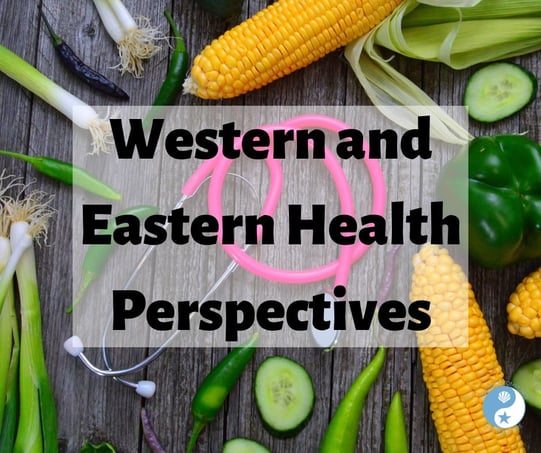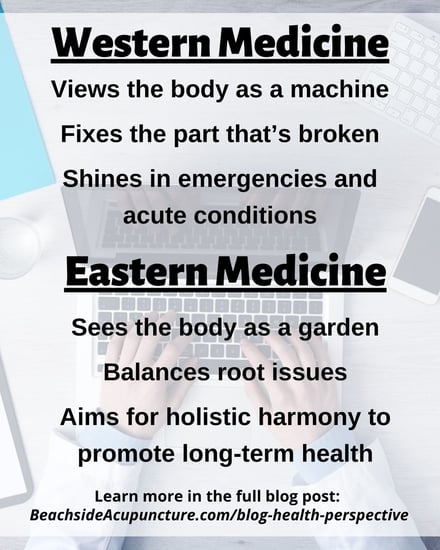
This post contains affiliate links, meaning Beachside Community Acupuncture PLLC may receive a small commission for purchases made through certain links at no additional cost to you. (In other words, you support us in a small way when you buy the products that we highly recommend and would use ourselves!) Click here to view our full disclosure policy.
It's not a big shock that Eastern and Western cultures view health from very different angles. Each has its own unique history and values, and each population has its own diet staples, habits, and stresses. When looking at the body and healing from each perspective, we like to borrow from (and slightly modify) the descriptions Ted Kaptchuk uses in his book The Web That Has No Weaver.
Western Medicine = Mechanics
If a car's radiator has a crack in it, a mechanic will usually repair or replace the radiator; it doesn't make sense to do anything to the car's other parts that are still running well. If something else goes wrong, the mechanic will fix that something, and keep looking at each issue in isolation until maybe a pattern develops.
Most Western medical doctors have a similar mindset: If a patient has gallstones, remove the gallbladder. If a patient has shoulder pain, see a shoulder specialist. The problem at hand is often solved without having to look at the rest of the body.
This perspective shines in emergencies, where an acute condition needs an immediate localized treatment. A burst appendix, a compound fracture, a heart attack... There are plenty of scenarios when a targeted approach that's laser-focused on a specific area is the best call.
The emphasis of specialization in Western medicine can also be very helpful. Many medical doctors spend years of additional training to excel in their chosen specialization, which means instead of being a jack-of-all-trades, a doctor can become very, very good at one thing and only treat that one thing. For example, when our Licensed Acupuncturist fractured her metatarsal in 2023, she sought out a surgeon who specialized in feet because she wanted someone who had a lot of experience with their complex structures.
Eastern Medicine = Gardeners
Putting together a bountiful, beautiful garden takes work and requires knowing all of the factors that can cause havoc. Each plant needs just the right conditions in order to thrive and having an ecosystem full of thriving plants takes careful planning. The soil can lack nutrients, there can be too much or too little sunlight, there can be too much or too little water, the temperature can be too cold or too hot... A lot can go wrong, so a gardener must view the landscape as a whole.
In Traditional Chinese Medicine (TCM), Licensed Acupuncturists see symptoms as clues to root imbalances. Everything in the body is interconnected, and even if a patient has a very specific complaint, all other elements of health are taken into consideration as well. The body knows how to heal itself when it is in balance, so harmonizing Yin and Yang, the Five Elements, the organ systems, etc. will naturally lead to a decrease in symptoms. An acupuncturist will choose acupoints to address symptoms but will always have an eye on the end goal of overall wellness.
Thousands of years ago, acupuncturists would treat emergency conditions, but nowadays it's better to seek help with a Western practitioner. For chronic issues, however, TCM has an advantage. Specialists can often have too narrow of a focus, and looking at body parts in isolation can miss the big picture. Spot treating instead of working on a root cause can even contribute to more problems in the future. There are a myriad of factors that affect health, and being mindful of all of them will usually lead to the best long-term outcomes.

Complementary, Not Alternative
It's worth remembering that the generalizations in this post are just that: generalizations. There are practitioners of Eastern medicine who treat patients like cars, and medical doctors who treat patients like gardens. Refusing to see one or the other because of preconceived stereotypes may backfire. Medical doctors are beginning to embrace functional and integrative practices, and some Licensed Acupuncturists choose to specialize.
People tend to polarize these two perspectives, but they don't have to be exclusive to one another. (In fact, they often work very well together!) For instance, surgery may be required for displaced fracture, but acupuncture can build the body up before it and help it recover postop. Acupuncture can also benefit patients with diabetes, but regularly checking blood sugar is still important. Integrating multiple systems of medicine means getting the most well-rounded care plan.
This post was originally published in April of 2017 and was updated in September of 2025.

Kathleen Ketola is a Licensed Acupuncturist and the owner of Beachside Community Acupuncture. She loves providing affordable acupuncture to the residents of McKinney, Texas, and surrounding cities like Prosper, Frisco, and Melissa, but she also enjoys educating the general public on how acupuncture and Traditional Chinese Medicine (TCM) can treat everything from pain to infertility to stress and beyond. Book online or contact her at (214) 417-2260 if you'd like to schedule an appointment.










Write a comment